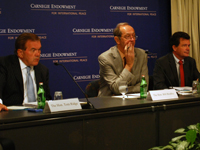Registration
You will receive an email confirming your registration.
America's transportation program is facing demolition by neglect. Calls to “do more with less” when the nation's infrastructure is crumbling ignore the needs of a system in rapid physical decline. Failure to reform the transportation system risks deepening U.S. dependence on oil and eroding global economic competitiveness. Is there a way to produce a long-term strategy that will simultaneously stabilize gas prices, finance America's transportation infrastructure, and decrease the deficit? Carnegie's Leadership Initiative on Transportation Solvency was created to do just that—develop a non-partisan solution for funding a better transportation system in the United States.
Former U.S. Senator Bill Bradley, former Pennsylvania Governor and Secretary of Homeland Security Tom Ridge, and former U.S. Comptroller General and now founder and CEO of the Comeback America Initiative David Walker, released their landmark new report, Road to Recovery: Transforming America’s Transportation, and discussed their recommendations for reforming and funding the federal transportation program. Jessica Mathews made introductions and David Burwell moderated a discussion on the importance of transportation investment for America's future.
Diagnosing the Problem
- An Insolvent Program: Walker pointed out that the Interstate Highway System was established in 1956 on the funding principle of “pay-as-you-go,” yet the gas tax has not been raised since 1993, even as American’s infrastructure needs have grown. As a result, approximately $25 billion is borrowed every year to bail out the Highway Trust Fund’s shortfall between outlays and revenue.
- An Aimless Program: Bradley noted that despite the critical role infrastructure plays in driving economic competitiveness, the current transportation program lacks a clear set of national goals and suffers from weak federal oversight. A complex set of funding formulas, unaccountable earmarks, gross neglect of system maintenance, and a lack of quantified performance benchmarks all contribute to sub-optimal outcomes.
- An Addicted Program: Ridge recounted that the American public has been promised “energy independence” and relief from volatile swings in oil prices for decades. The current transportation system, however, exacerbates these fragilities, with 94 percent of transportation energy coming from oil, a reliance that accounts for 70 percent of all U.S. petroleum demand. Moreover, petroleum imports account for over half of the growing U.S. current account deficit, with a majority of these imports coming from countries that the State Department has labeled as “dangerous or unstable.”
Principles for Reform
- Increase Efficiency: The report was based on the methodology of the Government Accountability Office, which Walker headed from 1998-2008, in screening all 108 federal transportation programs to determine which ones are outdated or duplicative. All three leaders agreed that overlapping programs should be merged and those that are no longer relevant should be eliminated.
- Invest for Growth: Europe is investing twice as much in transportation and China is investing four times as much as the United States as a share of GDP, said Bradley. With funds in short supply, the United States delays critical upkeep and improvements to America’s roads, rails, and mass transit. The panel warned that a lack of strategic priorities and inadequate investment ultimately translate into higher costs for American business; slower, less reliable access to markets; and more expensive future maintenance.
- Price for Solvency: Pricing transportation carbon through an assessment on petroleum would provide needed revenues and deliver an array of strategic benefits, outlined Burwell. any revenue mechanism supports American energy security goals, encourages innovation and competitiveness throughout the energy and transportation sectors, and is consistent with American priorities for a healthy environment and climate. Policymakers should also be mindful of revenue sustainability, with an eye toward potentially transitioning to other innovative user-based fees in the future.
Transformational Solutions
- Leadership by Example: Walker noted that the group’s non-partisan effort is indicative of leadership by example, and that the report represents the type of prioritization needed throughout the federal government given the country’s dire fiscal outlook. Bradley echoed this idea, arguing that America cannot compete in a twenty-first century global economy with a twentieth-century infrastructure. All three leaders said that transformational—not just incremental—reform is necessary to bring the transportation program back in line with strategic national priorities.
- Return on Investment: More than 80 percent of transportation funds are allocated by formula, rather than by need or performance. Even worse, congressional earmarks are not subject to standard planning requirements, nor are they required to show that their benefits outweigh their costs. Bradley, Ridge, and Walker called for a permanent ban on transportation earmarks and for the introduction of metrics to ensure projects are cost-effective, necessary, and promote long-term economic growth.
- Establish a National Infrastructure Bank: A National Infrastructure Bank, led by an independent board of directors, should be founded and charged with ensuring transportation projects meet national, not just parochial, objectives, said Burwell. Such a bank would unlock private capital and place investment in the hands of professionals, not politicians.
- Oil Security and Price Stabilization Fee: An ad valorem tax would be applied to oil imports and oil production. As oil prices rise, the ad valorem tax would generate greater and greater revenue while the tax on retail sales of gasoline would be reduced. When oil prices decline, the tax on retail sales of gasoline would be augmented. Such a fee would simultaneously raise needed revenue for transportation infrastructure and exert a countercyclical effect on prices at the pump.
